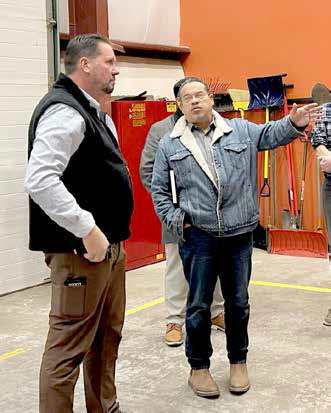Minnesota Attorney General Keith Ellison told a crowd at Vermilion Community College last Thursday that he will put the focus on affordable living in the months ahead.
“We’re going to prioritize economic affordability issues, we’re going to prioritize fair economy, we’re going to prioritize prosperity for working people,” Ellison said.
As part of the Protecting Minnesota Community Forums tour, Ellison presented on legal efforts to protect Minnesotans’ rights and provided a platform for residents to share their concerns about federal policy impacts.
The attorney general has also hosted town halls in Bemidji, Brainerd, Grand Rapids and Hibbing, among other locations. While in Ely, Ellison toured around town, including a stop at the local Twin Metals facility.
The forum, with around 60 people present, opened with an overview of recent legal actions taken on behalf of the State of Minnesota, with the goal of increased transparency.
“It’s my responsibility to let you know what I’m up to,” Ellison said, “That’s what it means to be a public servant.”
This November, the Supplemental Nutrition Assistance Program (SNAP) has loomed large for the attorney general’s office. Ellison said they “were in court with the president” just last weekend.
“We went back to court and said, you’re going to do the full (payment). And last weekend, everybody on staff got their EBT card full,” Ellison said, “It’s a big deal.”
Another focus has been the National Guard, with the recent mobilization of troops around the country to police locations that are not within their home states.
“Some of you, like me, have loved ones in the military, have loved ones in the National Guard, and these folks have day jobs,” said Ellison, “If we’re going to ask them to not do what they go to do every day - plumbing, working at an auto repair shop, teaching - then there better be a good reason.”
Ellison said he will sue “within 24 hours” if the White House attempts to federalize Minnesota’s National Guard or send troops into the state.
Four community leaders spoke at the event to bring local impacts of federal policy to the Attorney General’s attention.
Riana Hegman of Ely’s Community Care Team listed federal funding reductions for Medicaid, human service programs, and behavioral health supports as primary concerns for her rural health coalition.
These cuts have started “to affect critical pieces of the structure we have built,” Hegman said.
“Housing and food insecurity are rising. Insurance costs are going to skyrocket, and at the same time, the needs of our residents are becoming more complex,” Hegman said, “When policy choices weaken essential services, the result is increased disparities, increased crisis utilization, and increased burden on counties, law enforcement and emergency departments.”
Ely-Bloomenson Community Hospital CFO Tim Balthazor also pointed to concerns with federal health policy trends, advocating for EBCH to keep its critical access designation and notfor- profit status.
“These mechanisms aren’t about profit. They were intentionally designed as safeguards to keep our lights on, our doors open, our workforce employed and care accessible,” Balthazor said, “When these protections are weakened, our entire rural safety net is in jeopardy.”
Jess Edberg, the executive director at the Dorothy Molter Museum, spoke about tariff impacts on the museum’s root beer sales. Dorothy’s Isle of Pines Root Beer is a proprietary product which supports 60% of the nonprofit’s annual operating budget, Edberg said.
Since January 30, Edberg reports an eight percent increase on production costs due to tariff-induced price increases, despite sourcing all packaging and flavoring from U.S. manufacturers.
“The demand on domestic materials has continued to increase at an unsustainable rate and has outgrown the existing manufacturers,” Edberg said.
The museum raised root beer prices earlier this year to offset supply chain disruptions caused by ripple effects from the Covid years, but 2026 may bring an increasingly conservative budget outlook.
“Pulling back on fiscal growth is never a positive move for a nonprofit,” Edberg said.
Executive Artistic Director Ian Lah of the Northern Lakes Arts Association advocated for strong funding for community arts.
“Across Minnesota, the creative economy fuels more than $1.5 billion in annual activity,” Lah said.
Lah reports that “nearly half a million dollars” have flowed into Ely over the past three years through Minnesota State Arts Board support.
“This is what public investment looks like when it reaches rural communities directly. It creates momentum. It fosters belonging. It generates opportunity,” Lah said.
“The arts are not a luxury in rural Minnesota. They are essential to community life,” Lah continued, “They help young people build roots, keep businesses open, and strengthen the social fabric that sustains small towns.”
Ellison hopes to take Ely’s concerns back with him to St. Paul.
“The attorney general’s office (is) here to help people afford their lives and to help people live with dignity, safety and respect,” Ellison said.

Minnesota attorney general Keith Ellison visited with Dean DeBeltz at Twin Metals office in Ely.



